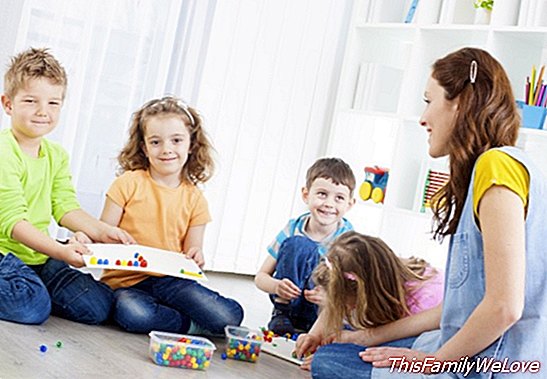I play and I learn: games to develop skills

The game is being incorporated little by little into the learning time of the children. Although many parents sound familiar with the phrase: "first" I finish "homework and then" I play and have fun ", the child of Early Childhood Education today learns playing.
The new concept of Educational Innovation includes work and play as components that balance action. For the child, the game is the means by which he relates and informs about his world and allows him to observe and experiment to complete his learning.
Children's games to develop different skills
Begoña Sánchez-Laiseca, teacher of Early Childhood Education, proposes these games that can be put into practice both at home and in the classroom. In addition, within the same game we can make use of other didactic materials that serve to develop skills and consist of different kinds of exercises.
1. Games to develop your manual dexterity: The objective is to advance in its manipulative coordination and fine motor skills. For this purpose, templates for stitching, punch for chopping different objects, skewered figures, insert construction sets or gears are used.
2. Playful activities to enhance observation, attention and memory: for this, numerical dominoes, geometric figures, basic phonological sequences (pass, weigh, step, pose) etc ... are used.
3. Games for mathematical logic: games of series, numerical dice, calculations, rulers, addition and subtraction with objects.
4. Games to enhance visual and tactile perception: puzzles, puzzles, objects in different textures.
5. Games to enhance reading: the learning of the letters through cutouts, of puzzles of syllables and words etc.
Benefits of games to develop skills
The game is a socializing activity, playing you learn to be in a group, to save the turn and to share. The game itself has its own rules in such a way that it is necessary to know and respect them in order to play. The rules through the game are experienced fundamental and enablers of the activity and if they are not met, it can not be done.
In learning at home, the child should also be encouraged through play. For example, instead of telling your young child: order your room right now! You can put a song and, to the beat of a music, pick up dancing, or associating objects in the same place etc ...
Playing with words facilitates a richer learning of the language, playing to order and placing everything in its place affects the learning of logic and its relation to mathematical thinking, as well as playing with the names of the labels of the products Food or clothing brands power the analysis of "what is written" that is essential to learn to write or read.
Every day, propose what you want your child to learn and how you are going to play with him so that he can learn it. Play to discover the world that is waiting for us to share what it contains and what is worthwhile. For example, today play the numbers play to find all the numbers that are seen on the street while you go home from school. Do you realize that the numbers are there in front of your eyes so you know what they are like, what they represent, how they are use? And tomorrow when you've seen them, play to explain what you see in them: some are few, others are more, the license plates are "four" · those of the houses are "one" of "two and sometimes of "three" ... Teach your child the game of looking and seeing and wondering about everything around them.
Jaime Márquez
Advice:Begoña Sánchez-Laiseca, teacher and expert in Early Childhood Education




